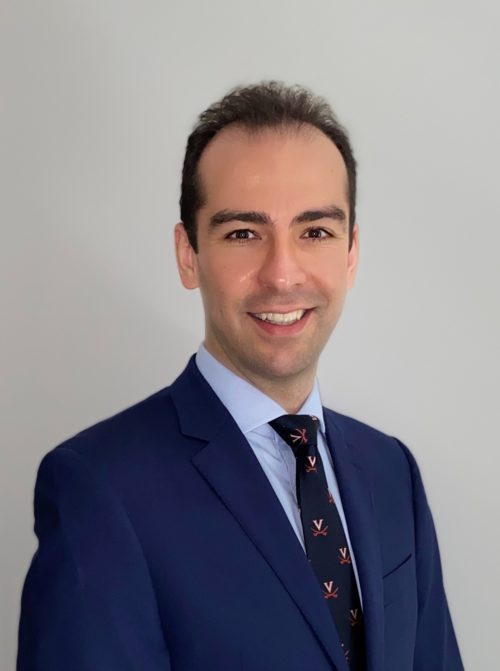
At a Glance
- Title: Assistant Professor
- Fellowships: University of Maryland Medical Center, Vascular Surgery; Cleveland Clinic, Complex Endovascular Aortic Surgery
- Residency: Mount Sinai Health System
Behzad Farivar, MD, joins UVA Health as the co-director of the new UVA Aortic Center and the associate program director for the vascular surgery fellowship training program in the Division of Vascular and Endovascular Surgery.
What is your clinical focus?
I am a vascular and endovascular specialist. I treat patients with wide spectrum of circulatory conditions such as carotid disease, aortic aneurysm disease, and peripheral arterial disease. Specifically, I am interested in minimally-invasive endovascular treatment of complex aortic aneurysms and dissections.
Why did you choose to become a vascular surgeon?
Vascular disease is complex and necessitates lifelong surveillance and management. Its surgical operations require significant precision and attention to detail. I often meet patients in their most vulnerable moments because of a limb- or life-threatening condition. I feel privileged to have patients entrust me to do everything we can to save their limb or life. I feel fortunate to be able to establish lifelong relationships with many of my patients.
As a vascular surgeon, I am able to offer my patients comprehensive medical, surgical or endovascular/interventional therapy. Each therapy is tailored to the patient to minimize risk and provide them with the best long-term result so they can live fulfilling, long lives. I could not think of another career that would be this rewarding.
The specialty has undergone a significant revolution since the turn of the century. We are now able to treat patients with vascular disease via percutaneous approaches, using a small incision and work from inside the blood vessel. There is minimal discomfort, shorter hospital stays, faster recovery times and lower risk to the heart and lungs with these procedures. These procedures were not possible a couple of decades ago.
What goals have you set for the launch of the UVA Aortic Center?
The center will serve as a multidisciplinary, tertiary referral care center for patients with complex aortic conditions. The number one priority of the center is to provide comprehensive, multidisciplinary, high-quality care to patients with aortic conditions. Expanding research and education efforts will serve to further advance innovative treatments and provide cutting-edge patient care.
Are there any studies you’re particularly excited about?
We have multiple ongoing major research trials here at UVA evaluating a spectrum of innovative treatment options for patients with vascular disease. I am particularly excited about several research trials allowing us to evaluate new endograft technology for the treatment of aortic disease and the use of non-ionizing radiation technology.
Why is it important to you to be involved in educating aspiring surgeons?
I believe in treating my patients the same way I would like myself or my family be treated when they are in need of medical care. I try to parlay that to future aspiring surgeons. Educating future generations is our ultimate legacy to continue to advance medicine and to provide high-quality care for generations to come.
You were the first surgeon in the U.S. to perform an endovascular aortic aneurysm repair using endovascular 3D navigation technology. What are the advantages of this technology?
At this time, nearly all minimally invasive endovascular procedure are performed using ionizing radiation. This can have a significant lifelong health risk from radiation exposure to both the surgeon and the patient. This 3D navigation technology allows us to potentially eliminate the need for these procedures to be performed using ionizing radiation.
What else makes you unique from other doctors in your specialty?
I have received highly specialized training and have extensive experience in minimally invasive, endovascular treatment of complex aortic aneurysms using fenestrated/branched endografts. This allows us to treat patients with complex (thoracoabdominal) aortic aneurysms who are not candidates or are too high risk for conventional open surgical operations with minimally invasive, percutaneous procedures.
If you were to retire tomorrow from medicine, what would you do?
I would be a research scientist.
UVA Health is now open for in-person care for new and existing patients. Call UVA Physician Direct at 800.552.3723 to refer a patient.
To transfer a patient to UVA Health, call the UVA Transfer Center at 844.XFERUVA (933.7882).
Contact Us
Our Physician Relations Manager, Liz Nottingham, is available by phone (434.981.1023) or email to answer your questions and help with problem solving. Feel free to reach out to her as needed.